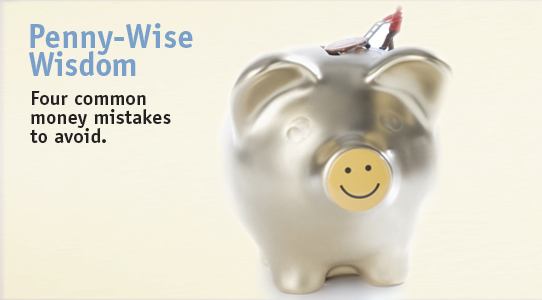Americans are wallowing in debt like never before. Counting all types of debt, from mortgages to student loans to credit cards, three out of four of us are in the red, according to the Federal Reserve’s 2004 Survey of Consumer Finances. In the first quarter of 2008, average household consumer debt (not including mortgages) amounted to more than $19,000, according to Federal Reserve data. While the current economic crisis has tightened restrictions on lending and led to a slight decrease in average personal debt load, falling home prices, negative net worth and stagnant wages have made existing debts all the more challenging to wrestle into submission. And most experts predict the current recession will be protracted and harsh.
The strain that debt puts on personal finances is significant, but that’s not the whole story. What the headlines rarely mention is the high toll debt exacts on our mental and physical well-being.
Two surveys last year hinted at the breadth of the problem. The first, conducted by the American Psychological Association (APA), found that 75 percent of Americans are stressed about money. The second, by the Associated Press–AOL, showed that people who were the most stressed about debt were also more likely to be suffering from digestion problems, muscle tension, migraines, severe anxiety and depression.
“Debt really is trouble when it comes to people’s financial and emotional lives,” says Jean Chatzky, financial editor of NBC’s Today show, Oprah regular and bestselling author. “Debt is shameful. I try to convince people that they are not their credit score, but that is not how we were raised to see it.”
None of this comes as a surprise to Kelly McGonigal, PhD. A Stanford University health psychologist, McGonigal teaches stress-management classes that include a focus on coping with debt. She sees an undeniable link between debt stress and poor health. “Just thinking about losing your job, losing your home — and mentally playing out those worst-case scenarios — exacerbates stress and, therefore, physical problems,” she says. “Every time you have a stressful thought, it moves you closer and closer to a disease state or a pain state.”
The good news: If we are willing to take a close look at our debt, understand its underlying causes and secondary effects, and then shift our spending habits, we can minimize not just our excess financial obligations, but also the stress-related physical problems to which they give rise.
The Debt Effect
Of all the stressors in our lives — work, relationships, lack of free time — angst over money and debt may be one of the most corrosive. McGonigal says it is “one of the most toxic kinds of stress” because it can’t be compartmentalized.
Most people who have stress at work or at home can find a healthy escape by channeling their energy into something they enjoy, she explains. If work is stressful, for instance, some people take refuge in their family life or enjoy a favorite pastime. “But when you have serious financial worries, it affects your family, your home, your job and your ability to serve your community,” she explains. “Eventually, debt stress taints whatever good you have going on in your life.”
That kind of invasive anxiety wreaks havoc on our health in two ways. The first is a direct cause-and-effect mechanism. When the body is stressed, the brain plunges into fight-or-flight mode. Thinking the body needs extra resources to meet a physical challenge, the brain signals the adrenal glands to release a hormonal brew consisting primarily of adrenaline and cortisol. The adrenaline causes the heart to race, which elevates blood pressure and boosts energy reserves. The cortisol preps muscles for bursts of speed by telling the body to dump glucose (sugars) into the bloodstream. It also diverts energy from the immune, digestive and reproductive systems — any bodily function not essential to a quick escape.
That’s fine, even useful, if the stressor lasts a few minutes and helps you to escape from physical harm. But when the body is trapped for days, weeks or even months in fight-or-flight mode, adrenaline and cortisol are chronically elevated, a condition that suppresses metabolism, promotes inflammation, and can cause or exacerbate a host of health issues, ranging from heart disease to diabetes to infertility.
“The physical stress response evolved to help us handle short-term, life-threatening challenges,” says McGonigal. “Depending on your mindset about debt, you can literally be in a stress response 24 hours a day, which is incredibly unhealthy.”
And the ways people routinely deal with that stress can cause more problems. “Stress triggers primitive coping strategies that offer an immediate sense of security and abundance, as well as the promise of reward,” McGonigal notes. Essentially, our brains go into emergency mode. That can undermine our ability to think clearly, and it can also trigger cravings for self-soothing comforts like chocolate chip cookies, alcohol or cigarettes — anything that triggers the brain to release feel-good chemicals, such as opioids, that temporarily interrupt the stress response.
Equally damaging, the scarcity mentality that often accompanies debt stress can cause people to cut back on self-sustaining behaviors that are essential for emotional and physical health, she says: “Things like spending time with friends, buying fresh produce instead of processed foods, exercising and getting enough sleep — these are true self-care actions, the things that sustain our well-being in the long term as opposed to giving us a short-term comfort fix.”
The Origins of Debt
While all Americans are bombarded by the same cultural messages about spending — bigger is better, diamonds are a girl’s best friend, whoever dies with the most toys wins — not everyone concedes to a lifetime of overspending and debt. What’s the difference between those who resist external pressure and those who give in?
That question sparked the curiosity of Tahira Hira, PhD, a professor of personal finance and consumer economics at Iowa State University in Ames, Iowa. Her conclusion? It comes down to what’s on the inside. More often than not, she says, debt handcuffs those who suffer from low self-esteem or a lack of accountability.
Of all the negative emotions that lead to overspending, low self-esteem may be the most influential. A study published last August in the Journal of Consumer Research found that when people feel powerless, they have strong desires to buy things that convey high status.
University of Chicago researchers asked student volunteers to describe a situation in which they had power over another person or one in which someone had power over them. Then the students were asked how much they would be willing to pay for various high-status and low-status items. After thinking about times when they felt powerless, participants were willing to spend more on high-status items, like a silk tie, an executive pen or a fur coat, while ignoring low-status items, like a sofa, a ballpoint pen or a clothes dryer.
People often try to determine their value in their own eyes and in the eyes of others by spending money on expensive things, says Hira. “Even though it may seem that we are doing these things to impress other people, what we are really trying to do is impress ourselves, convince ourselves that we are OK.” In reality, though, overspending only aggravates the self-esteem problem, generating shame, guilt and hopelessness — and the desire to buy new things.
McGonigal calls this dynamic the “what-the-hell effect,” a phrase she borrows from diet researchers who use it to describe why dieters who eat one prohibited item are then inclined to scrap their diets entirely. She says it’s not unusual for people who are working hard to manage their money to do the same thing: They slip up, make an extraneous purchase, and then, instead of recognizing their mistake and reinvigorating their commitment, they throw up their arms in disgust and toss their entire budget out the window.
“We are always monitoring our goals and how well we are meeting them,” says McGonigal. “If we notice we’ve done something inconsistent with our goals, we feel bad, and we tend to say ‘I already feel bad about myself, so why don’t I just go ahead and spend even more?’”
And then there’s the fact that everyone else has lots of cool stuff. Or at least that’s the impression we get from the luxurious lifestyles portrayed on TV every night. If they’re living the high life, after all, why can’t we?
“People are no longer trying to keep up with their neighbors, they are trying to keep up with the highest level of luxury they see on television,” says McGonigal.
Today’s abundance of home shows, garden shows and reality shows makes extravagant lifestyles seem like they should be within everyone’s reach, she adds. “That sense that you don’t have what you deserve is toxic and can invade every aspect of your life.”
Spirituality and Debt
While it’s important to understand the psychological roots of debt, some experts say people will never be free unless they explore debt’s spiritual side — the unconscious part of us that feeds off wanting, buying, owning, paying — and, yes, even owing.
“What keeps us caught in the debt-spend cycle is our unwillingness to look honestly and openly at why we are behaving the way we do with money,” says financial planner Brent Kessel, author of It’s Not About the Money (HarperOne, 2008).
The first step, says Kessel, is to identify the inner void that leads to spending. He points out that everyone has moments in life when they feel sad, empty and deflated, and many of us react to those moments by spending. “Madison Avenue tells us that if we buy the right things, we won’t ever feel despair or sadness,” he explains. “The mind latches onto shopping and then associates that with what makes you happy.”
To overcome our initial reflex to shop when difficult emotions surface, Kessel suggests that we just try to observe our thoughts: What are we thinking and feeling in that moment? How do those feelings contribute to the urge to spend?
From there, he says, we must identify our feelings (longing, envy, loneliness, resentment, etc.) and then, instead of squelching them, acknowledge and accept them. “The craving mind is like a 3-year-old,” he says. “It’s often angry, frustrated, and it wants what it wants. The goal is not to avoid those feelings, but to be relaxed and open to them. If you can make it to the other side of those feelings, there is a huge amount of self-love waiting for you.”
Perhaps the most essential reframing opportunity we have around our debt, says Kessel, is to see it as a powerful impetus for change. “Debt is a tangible bell of awakening,” he says. “Instead of trying to get around it, go right into the heart of it, feel those feelings fully, and ask them what they are here to teach you.”
Debt’s lessons may not be comfortable, but they point the way to a better life, one as rich in emotional satisfaction as it is in financial abundance.
Lower Your Debt Stress
If debt is stressing you out, here are three ways to reframe the way you think about what you owe.
Find at least one person you can be honest with about your debt. “Saying it out loud — ‘I’m up to my eyeballs in debt’ — can be very powerful and help break the shame cycle around debt,” says Denver psychologist Stephanie Smith. The physical act of speaking can begin to alleviate anxiety, and friends can offer new perspectives. “We only see the bleakest of futures; we don’t see our positive options,“ she says. “Often when you talk to someone, they can shed some light on the situation.”
Choose your media influences carefully. If looking at pictures of fashionista celebs makes you want to own couture you can’t afford, curtail your fashion-magazine habit. If gadget catalogs are your weakness, get off those mailing lists. If watching lap-of-luxury TV characters makes you feel underprivileged, turn the channel — or turn off the TV entirely. “This stuff gets stuck in your subconscious and it is going to influence your emotions and your behavior even if you tell yourself it won’t,” says Stanford University health psychologist Kelly McGonigal. “Start to pay attention to that low-level twinge you feel when you see something you want,” she says. “By simply noting how you’re feeling, you can start to withdraw from the cycle of ‘I see, therefore I want.’”
Start saving. As soon as debt-laden people make a little money, they usually scramble to pay off bills, says Brent Kessel, a financial planner and author of It’s Not About the Money (HarperOne, 2008). So they never experience a feeling of abundance or the pleasure of being rewarded for hard work. Instead, they are always in the red, which makes them vulnerable to falling back into old habits of self-soothing by shopping. Kessel suggests opening a savings account and putting away a few dollars every week. “It doesn’t take much to help shift your mentality away from deprivation to one of surplus.”
5 Ways to Start Digging Out of Debt
Ready to be debt-free? Here are five ways to get started.
Operate on a cash-only system. Set a budget for your weekly expenses, such as groceries and toiletries, and withdraw that amount of cash from the bank each week. Then spend only what you have in hand. “If you don’t have the cash, you don’t buy it,” says Stephanie Smith, a psychologist in Denver, Colo., who specializes in debt counseling. “We’ve become so accustomed to credit cards, we’ve lost all perspective of what cash can buy and of what we can and cannot afford.”
Drive a wedge between looking and buying. To help curb impulse shopping, make a list of things you want to buy, then wait, says Kelly McGonigal, PhD, a Stanford University health psychologist. The act of putting the item on a list gives you the warm fuzzies that come with the promise of reward, she says. “But, two weeks later, you’ll be amazed at how much has fallen off the list because you’re no longer under the spell of the product’s advertisement or fantasy.”
Reduce your wants. Think of emails and catalogs from retailers as “want generators,” says McGonigal. Contact these companies and ask to be removed from their mailing lists, or subscribe to a service that will do it for you, such as GreenDimes.com. Toss unsolicited coupons directly into the recycling bin. “When you are trying to save money, nothing excites the brain more than the idea that you are getting a bargain,” she says. “But, obviously, you’re not saving money if you’re spending it — even if it sounds like a deal.”
Don’t ignore debt. People don’t realize that the seed of the stress response is rooted in the unknown, says McGonigal. So trying to keep stress at bay by not opening the bills or balancing the checkbook is bound to fail. “Your mind will keep trying to solve this problem, and the less information it has, the more it’s going to worry,” she says. “That puts you in a never-ending stress response and takes a huge toll on your health.”
Establish a pay-off plan. Having a clear strategy for paying your debts each month and knowing when you’ll be debt-free is great for peace of mind — and motivation. For tools you can use to start your own step-by-step payback plan.
Debt-Stress Resources
BOOKS
- It’s Not About the Money: Unlock Your Money Type to Achieve Spiritual and Financial Abundance by Brent Kessel (HarperOne, 2008)
- Deal with Your Debt: The Right Way to Manage Your Bills and Pay Off What You Owe by Liz Pulliam Weston (Prentice Hall, 2005)
- Your Money or Your Life: 9 Steps to Transforming Your Relationship with Money and Achieving Financial Independence by Joe Dominquez and Vicki Robin with Monique Tilford (Penguin, 2008)
WEB
- www.debtadvice.org — Run by the National Foundation for Credit Counseling, this site is designed to help you get out of debt and can also refer you to a trained, certified credit counselor.
- www.youcandealwithit.com — This site features a budget calculator and a five-step exercise to help you take control of your spending.
- www.napfa.org — The National Association of Personal Financial Advisors is the nation’s largest association of fee-only financial advisers.
Pay It Down
Having a clear, logical strategy for what you’re going to be paying each month and knowing the date by which you’ll be debt-free is great for your peace of mind — and your motivation. For a worksheet and directions, see www.creativehomemaking.com/debt_payoff_plan.html.
Financial expert Dave Ramsey has a pay-off plan he calls the debt snowball. The plan is designed specifically to create momentum and keep you on track. For instructions, see www.daveramsey.com/etc/cms/index.cfm?intContentID=4055.
Or pick up a copy of Jean Chatzky’s Pay It Down! From Debt to Wealth on $10 a Day (Penguin, 2004) for step-by-step instructions on getting out from under your debt. Visit her Web site for more information: www.jeanchatzky.com.



This Post Has One Comment
I’m so impressed by the writer’s ability to tap into our heads with it comes to debt. There are many emotions that are affected by the stress of debt, and this article really resounds with this reader. I am a compulsive spender and this trait only rears its ugly head when other things in my life get out of balance.